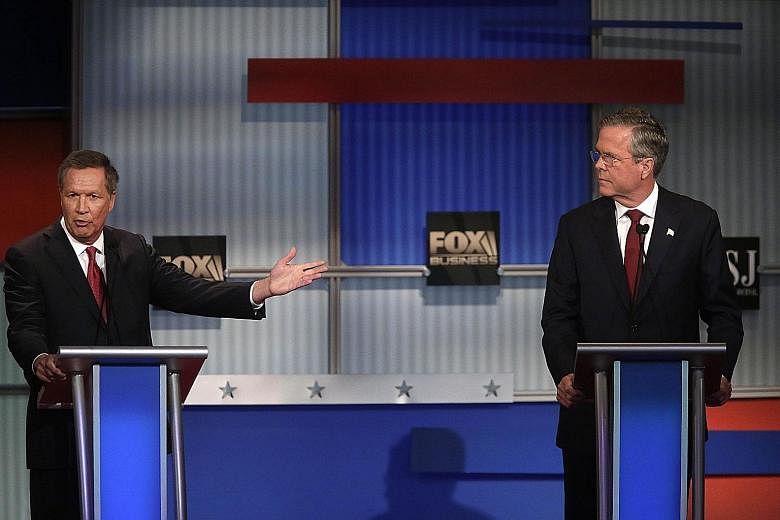MILWAUKEE • After weeks of personal sniping, the Republican presidential candidates clashed sharply over immigration and other policies at their debate on Tuesday, with Ohio Governor John R. Kasich and former Florida governor Jeb Bush trying to gain political momentum by heaping scorn on Mr Donald Trump's plan to deport unauthorised immigrants.
In the most substantive Republican debate so far, Mr Kasich and Mr Bush, who have been fading in polls, presented themselves as experienced chief executives who had practical solutions to deal with national challenges like immigration. Yet both men, in expressing support for a comprehensive immigration overhaul, embraced a position that is unpopular with Republican primary voters, many of whom agree with Mr Trump's harsh rhetoric about immigrants.
While candidates like Mr Marco Rubio and retired neurosurgeon Ben Carson received a pass from the moderators on immigration, Mr Kasich took on the issue directly after Mr Trump defended his plan to build a wall along the Mexican border and to identify and deport some 11 million people.
"Think about the families; think about the children," Mr Kasich said. "Come on, folks, we know you can't pick them up and ship them across the border. It's a silly argument. It's not an adult argument."
Mr Trump cited president Dwight D. Eisenhower's approach to deporting immigrants in the 1950s. But Mr Kasich retorted: "Little false little things, sir, they really don't work when it comes to the truth."
Mr Bush warned that Mr Trump's harsh proposals would drive Hispanic voters to support leading Democratic candidate Hillary Rodham Clinton: "They're doing high-fives in the Clinton campaign right now when they hear this."
But policy details and disagreements, for the most part, replaced nasty potshots on Tuesday. The candidates used the 90 seconds they were allotted for each answer to promote their tax proposals, to lament what they said were intrusive business regulations and to delve into the country's monetary policy.
Less than three months before Iowa begins the Republican nominating contest, candidates were feeling the urgency to distinguish themselves in a 14-strong field. They spoke more aggressively about their plans to cut taxes or create jobs - even if they did not deliver many specifics.
They barely explored recent controversies roiling the Republican race, particularly accusations that Mr Carson had embellished or even fabricated part of his inspiring life story. Asked if he was worried about those questions, Mr Carson drew strong applause from the audience by criticising the news media as biased against him.
Mr Trump and Mr Carson opposed a $15 minimum wage but offered no new proposals to help poor and working-class people. Mr Rubio agreed with them on the minimum wage but argued that higher education and vocational training must become more accessible and be aimed specifically at increasing wages.
"Welders make more money than philosophers," Mr Rubio said. "We need more welders and less philosophers." Mr Kasich noted that his state, Ohio, had increased the minimum wage and said that "people need help". He cited his plan to cut personal and corporate taxes and achieve a balanced federal budget by 2024.
The candidates were also mindful that the debate would be the last until Dec 15, so impressions made on Tuesday night could have lasting influence in the weeks ahead. The Republican race has been largely shaped by the forums, now four in all. Shattering viewership records, these monthly auditions for the presidency have become signal events.
Organisers from Fox Business Network said before the Milwaukee forum that they intended to push the conversation towards policy, vowing a "real debate about our economy and our future" in a commercial criticising CNBC's handling of the last one.
That raised the possibility, at least, of a discussion focused on the candidates' differences on the issues.
NEW YORK TIMES

